There are a number of sections within this document. Using the links below, or to the side, you can skip to specific sections.
- Introduction and foreword
- Creating context
- The Qii Strategy on a page
- Delivering the aims of the strategy
- Links to other DBTH strategies
- References and bibliography
If you need this page in another language, please head to: https://translate.google.co.uk. For more accessibility options and information, please visit: https://www.dbth.nhs.uk/a-z/accessibility/

The summary
If you’re short on time, you can listen to an audio summary of this strategy by clicking the media player below.
Introduction and foreword
I am pleased to present the Quality Improvement and Innovation (Qii) Strategy for Doncaster and Bassetlaw Teaching Hospitals (DBTH) for 2024-2028. This document outlines our ambitious vision to become a beacon of excellence in healthcare through continuous quality improvement and innovative practices.
At DBTH, our vision is encapsulated in the phrase “Healthier together – delivering exceptional care for all.”
This strategy is a crucial step in realising this ambition. Over the past five years, we have laid a strong foundation by embracing quality improvement methodologies and placing our patients at the core of our efforts. The accreditation of our Qii team as Specialist Practice Coaches in the NHS Vital Signs Improvement practice is a testament to our commitment to excellence.
The 2024-2028 Qii Strategy is structured around the four strategic priorities of Patients, People, Partnership, and Pounds.
It aligns with the NHS Impact model, emphasising a holistic approach to improvement, focusing on building a shared purpose, investing in culture and people, developing leadership behaviours, building improvement capability, and embedding these principles into our management systems and processes.
Our aims for the next five years are clear:
- New ways of working co-produced with patients, colleagues, and partners: We aim to integrate innovative approaches into our daily operations, ensuring that all improvements are designed and implemented collaboratively.
- Embedding Qii in our organisational culture: Quality improvement and innovation will become integral to how we work at DBTH, supported by comprehensive training and coaching at all levels.
- Recognition for our improvement work: We aspire to be acknowledged both within and outside the organisation for the effectiveness of our improvement initiatives, making DBTH a positive place to work.
- Realising tangible benefits across quality, morale, delivery, and resource use: By measuring the outcomes of our improvements, we will ensure they positively impact patient care, staff satisfaction, and financial stability.
- Using plain language: Clear communication is essential. We will use straightforward language to describe our methods and actions, making it easier for everyone to engage with and support our initiatives.
This strategy has been co-produced with input from various teams within DBTH, ensuring it is comprehensive and aligned with our overarching vision and values. I am confident that with the dedication and collaboration of our staff, patients, and partners, we will achieve our goals and continue to deliver exceptional care for all.
Thank you for your ongoing commitment and support.
Richard Parker OBE
Chief Executive
Doncaster and Bassetlaw Teaching Hospitals NHS Foundation Trust

Creating context
At Doncaster and Bassetlaw Teaching Hospital NHS Foundation Trust (DBTH) we have the vision of being Healthier together – delivering exceptional care for all. This Qii strategy is aligned to the overall vision and the four strategic priorities of Patients, People, Partnership and Pounds.
Quality improvement (Qi)
‘Quality improvement is about giving the people closest to issues affecting care quality the time, permission, skills and resources they need to solve them. It involves a systematic and coordinated approach to solving a problem using specific methods and tools with the aim of bringing about a measurable improvement.’ (Health foundation, 2021)
The last five years have seen DBTH lay the foundation of a quality improvement and innovation approach with patients at the heart of everything we do. Members of the Qii team have been awarded Specialist Practise Coach accreditation of the NHS Vital Signs Improvement practice meaning the lean based improvement approach can be internally coached.
Innovation
‘The introduction and application of processes, products, treatments or procedures, new to the team, department, ward, pathway, organisation or system and intended to benefit patients, staff, the organisation or wider society’. (Kings Fund, 2017)
NHS impact is a holistic approach to improvement recognising the importance of supporting functions in creating the correct environment for sustainable improvement to take place.
Improvement-led delivery
Involves a whole-system (or whole-organisation) focus on quality, using evidence-based quality improvement methods to increase productivity and deliver better health outcomes for patients and communities. It is underpinned by the use of data and measurement to achieve these outcomes. (NHS delivery & continuous improvement review, 2023)
The 5 main elements of the NHS Impact are described below:
Building a shared purpose and vision.
Create a vision and shared purpose in an inclusive and transparent way ensuring meaningful input from all, including those with lived experience.
Investing in culture and people.
Engage with people who work in healthcare roles and organisations and those with lived experience to design and implement the improvements based on what matters to them.
Developing leadership behaviours.
Support leaders across the system to live and breathe the values and behaviours of the organisation and hold leaders to account for behaviours, not just improvement outcomes.
Building improvement capability and capacity.
Identify or create an improvement methodology to use across your entire organisation, ensuring a local and systemic way of practising improvement.
Embedding into management systems and processes.
Develop an explicit management system that aligns with the strategy, vision and purpose of the organisation at board level and throughout all workforce structures and functions.
The key drivers enablers for the above are identified as:
- Co-production with people and communities
- Clinical leadership
- Workforce, training and education
- Digital transformation (including federated data platform and model health system)
- Addressing health inequalities
NHS England have set an expectation that all NHS providers, working in partnership with their integrated care boards, will embed a quality improvement method aligned with the improvement approach to support increased productivity and enable improved health outcomes (NHS England, 2023).[1]
At DBTH we believe that our people, along with our patients, carers, residents, governors, and partner organisations have the ideas and experience to contribute to improvement of the quality, safety, effectiveness and efficiency of our services; creating solutions for the way we design and provide our future services.
The 2024-28 Strategy has been co-produced with members of the Qii team, People & Organisational Development, Education and Research, Patient Safety & experience teams.
The aims of DBTH Qii for the next five years are:
- New ways of working are co-produced (Patients, our people and Partners)
- Qi is embedded in the way we do work at DBTH
- We are recognised for the effectiveness of our improvement work
- Tangible benefits are realised across the 4 domains of Quality, Morale, Delivery and Use of Resources
- We use plain language to describe the methods and actions.
The collaborative approach has ensured that there are links to the Trusts People Strategy the DBTH Nursing, Midwifery and Allied Health Professionals Quality Strategy, Research and Innovation Strategy and the Trusts Tackling Health Inequalities Strategy.
The Qii Strategy is summarised further within this document.
A plan of the aims identified has been developed and aligned with the strategic priorities, a summary of which can be found in the appendices.
The Strategy follows the 5 elements of the NHS Impact approach as described above.
Regular updates of progress against the milestones and objectives laid out in this document and details of activity will be reported to the Trust Board via updates through the Finance and Performance Committee. The update to the committee comes via the Trust Executive Group as part of the Recovery Innovation and Transformation reports and bi monthly Transformation Board reports. The reporting structure of activity is shown in the diagram below.

The Qii Strategy on a page
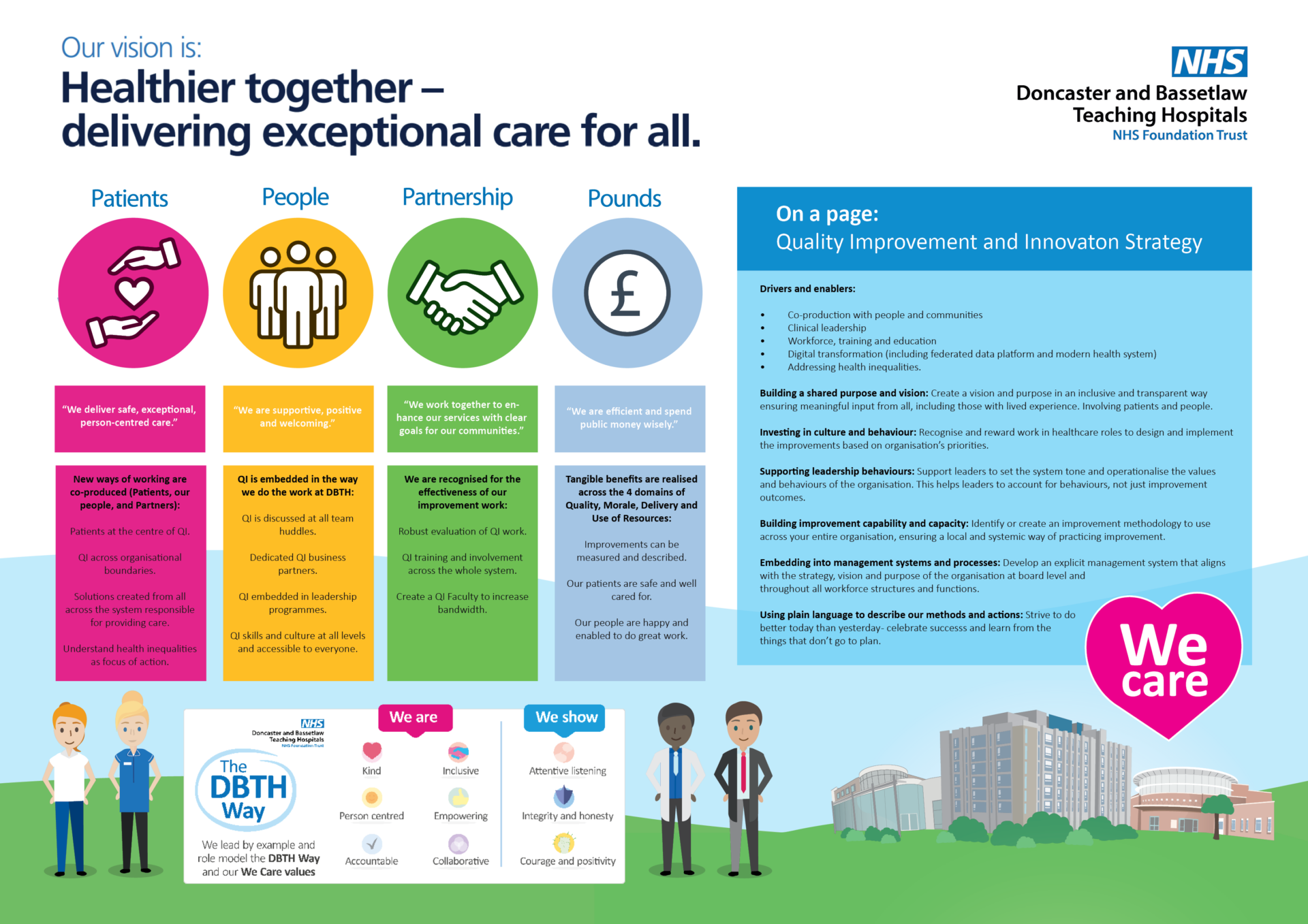
Delivering the aims of the strategy
The actions to deliver the strategy are described below. These milestones and objectives are designed to be live with more detail added to the ‘current year’. The updated milestones will be stored within the Qii shared drive and progress reported through the Transformation board and Finance and Performance committee.
You can skip to each aim by using the links below:
- Insert
Five-year aim: New ways of working are co-produced with our patients, our colleagues, learners and partners
- Strategic Priority Patients – We deliver safe, exceptional, person-centred care
This aim supports that patients are at the centre of our focus of improvement and innovation, that solutions are created from all across the system from people providing and receiving the care and consider all aspects of equity and equality. The support from the central Qii team will be determined by the priorities set by the System and Subsequently DBTH TH FT Executive team.
Supporting actions to deliver this aim:

Five-year aim: Qii is embedded in the way we do work at DBTH
- Strategic Priority People – We are supportive, positive and welcoming.
This aim supports that Qii is embedded in the way we do work at DBTH. To achieve this Qii business partners / practitioners will be aligned to divisions, Qii will be embedded into leadership programs, there will be opportunity to discuss improvement at team huddles and Qii skills will be present at all levels of the organisation. The purpose of this aim is to embed improvement and innovation into the culture of the organisation.
Supporting actions to deliver this aim;
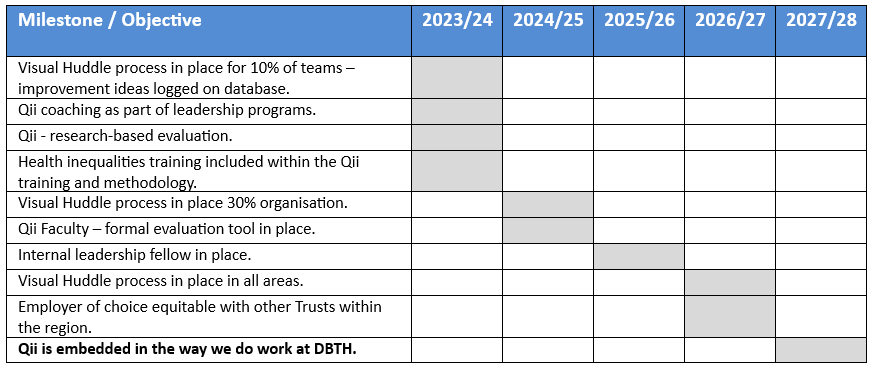
The overall training, coaching and engagement aims are schematically represented below.
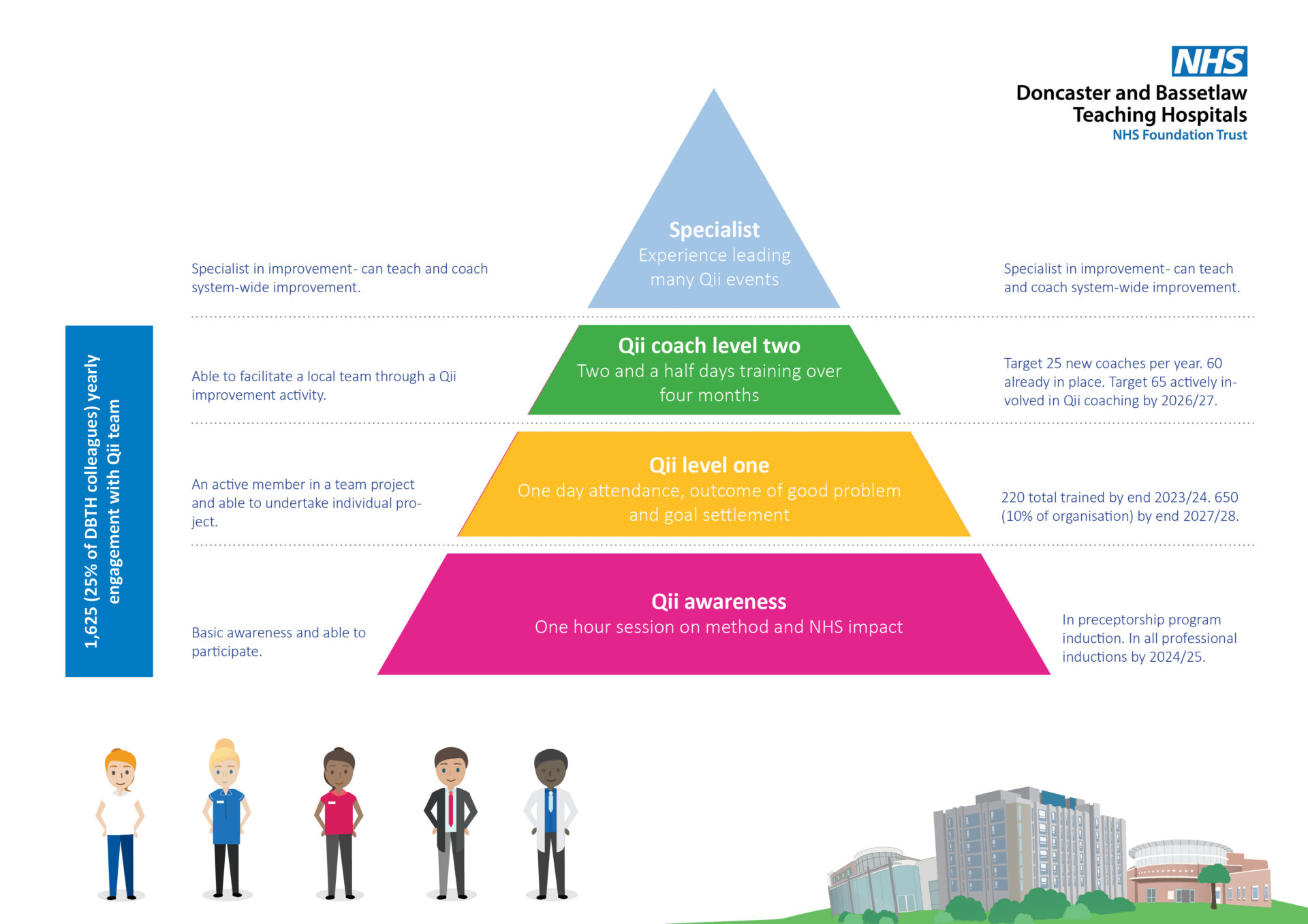
Engagement with the Qii team is planned to be achieved in 4 main ways. These are through projects that have been identified by the Executive team, projects identified via Qii business partners directly supporting the divisions and utilising the Qii level 2 trained faculty and support for local improvement projects identified through local huddles and by offering Qii training and coaching to all staff. Through these routes the Qii team are aiming to engage with 1,625 colleagues a year (representing 25% of the organisation).
Ultimately it is the aim to have more Qii projects active on the Qii database that are not supported by the Qii central team thus demonstrating that the Qii methodology is being embedded as part of the way we do work at DBTH.
The coaching and training are delivered over four main levels:
Qii Awareness – Colleagues are able to participate in Qii activities and are comfortable to raise suggestions. This awareness is delivered in the preceptorship induction and planned to be introduced in all professional inductions by 2024 / 25.
Qii Level 1 – At this level the person will be able to be an active participant in a wider Qii project and undertake individual projects. This is a 1-day training program, and the target is to have trained 220 people in this program by the end of 2023 /24 and 650 in total (representing 10% of number of employees) by the end of 2027 /28. This level is now also been offered to F1 and F2 grade doctors who attend DBTH as part of their rotation.
Qii Level 2 – A level 2 coach can lead a team through an improvement project and coaching other individuals through an individual project. The level 2 coaches form the Qii Faculty within the Trust. The 2 ½ day program is coached over a 4-month period. The aim is to coach 25 people a year at this level and have 65 active coaches leading Qii projects by 2026 / 27.
Specialist Practice Coach – A specialist Practise Coach is an improvement specialist with experience of delivering improvement using the change methodology. They can teach and coach all levels below.
Five-year aim: We are recognised for the effectiveness of our improvement work
- Strategic Priority Partnership – We work together to enhance our services with clear goals for our communities.
The improvement work at DBTH is celebrated and is recognised both within and outside the organisation making DBTH a positive place to work.
Supporting actions to deliver this aim:
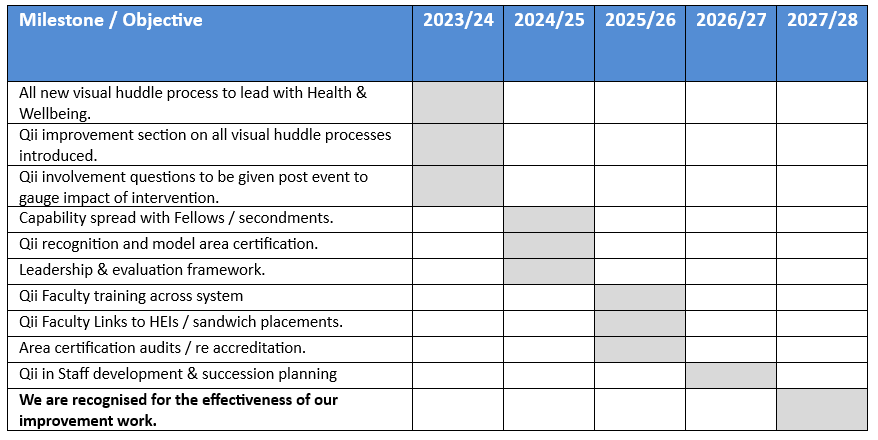
Five-year aim: Tangible benefits are realised across the four domains of Quality, Morale, Delivery and Use of Resources
- Strategic priority Pounds – We are efficient and spend public money wisely.
By measuring the benefits of Qii across a balanced scorecard of outcomes, patient and staff experience, delivery and effective use of resources we can ensure that all improvements can be measured and described, our patients are safe and well cared for, our people are happy and enabled to do good work and that we maintain a stable financial footing to continue to invest in improving patient care.
Supporting actions to deliver this aim:
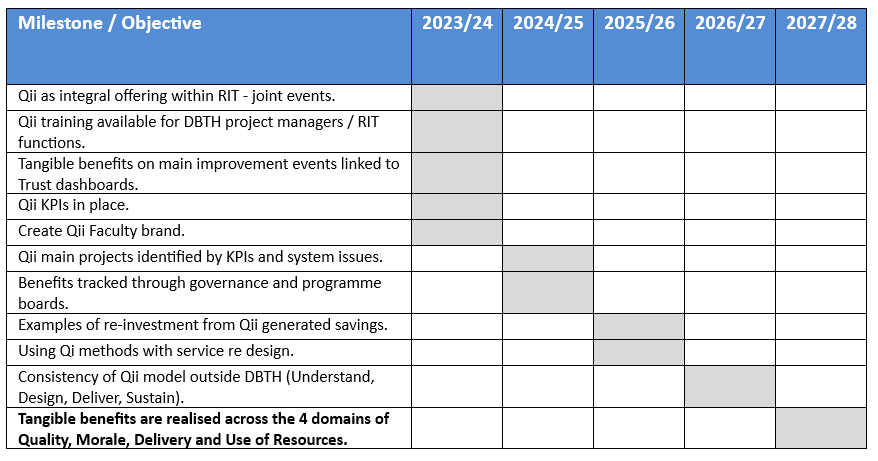
Five-year aim: We use plain language to describe the methods and actions
Using plain language helps and encourages people to realise that doing something better today than yesterday is improvement. We do this by celebrating success and learning from things that do not go to plan. A Qii communication plan was developed to support this aim a summary of which is shown below.
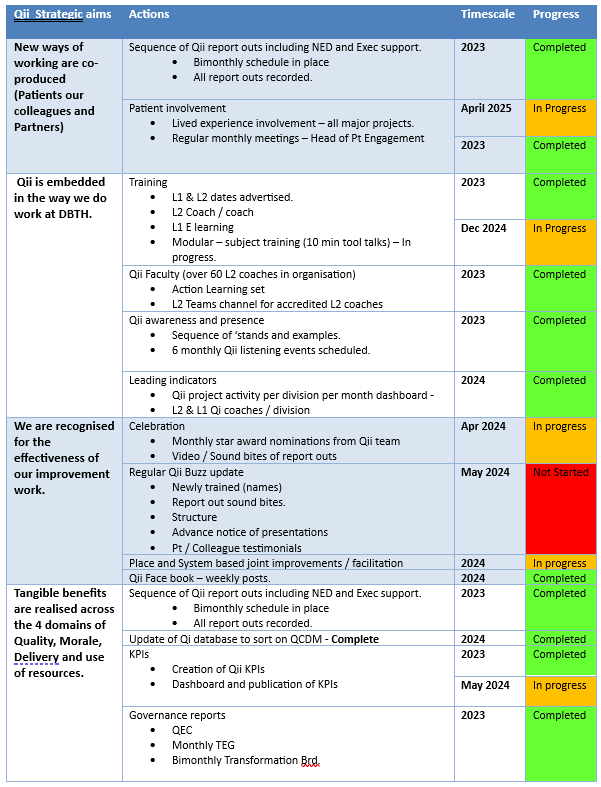
Links to other DBTH strategies
This Strategy has been co-produced with several other departments and in common with other DBTH Strategies has identified objectives that align with the overall Trust Vision, We Care values and the Trusts Strategic Priorities.
The Qii Strategy has strong links with the DBTH People Strategy (2023-2027) , specifically with ‘We are a Team’, ‘We are always learning’ and ‘We each have a voice that counts’ from the NHS People Promise and the WE CARE values of the Trust. The DBTH way, which has been recently revised and covers collaboration has Qii embedded within it as do the Leadership and Team development programs highlighted within the People strategy. This aligns with the identified drivers of workforce, training and education in the NHS impact approach.
As an enabling methodology Qii fully supports the DBTH Nursing, Midwifery and Allied Health Professionals Quality Strategy (2023-2027) six strategic aims of Patient safety, Patient experience, Clinical effectiveness, Fundamentals of care, Care of most vulnerable patients and Care planning and documentation. These align to the identified drivers of Co-production with people and communities and clinical leadership in the NHS impact approach and therefore the DBTH Qii strategy.
The 5 pillars of the DBTH Tackling Health Inequalities Strategy of Understand our communities, Connecting people, Model of delivery, Access to services, Leadership and accountability align with the co-production and leadership elements of the NHS impact and DBTH Qii Strategy. Health inequalities (HI) training is also being included in the Qii training to ensure that this is considered during any improvement initiative. As with the Nursing, Midwifery and AHP Quality strategy Qii is an enabling methodology to the Tackling Health Inequalities Strategy. By embedding HI into the Qii training and methodology ensures that HI will also be considered during Qii programmes.
The Qii Strategy is also aligned with the DBTH Digital Transformation Strategy (2021 – 2024) in particular with the aim statements around Our Patients, Our Workforce, Our System Leadership, Our Data Analytics and Our Technology Systems.
Within the DBTH Research and Innovation Strategy (2023- 2028) the priority areas of Improving Health and Welbeing , the use of data and digital transformation to address unmet health need, improving maternal and child health aligns with the enablers described within the NHS impact model. The strategy itself was developed with ‘our patients, people, and partners very much at the heart of it’ which is the cornerstone of any innovation and improvement work.
The required drivers and enablers of the NHS Impact model, of which the DBTH Qii Strategy is based,, of Co-production with people and communities, clinical leadership, workforce, training and education, digital transformation and addressing health inequalities are all addressed in the above supporting DBTH strategies.

References and bibliography
Health Foundation (2021), Quality improvement made simple.
NHS England PRN2137 (2023), NHS delivery and continuous improvement review: recommendations.
CQC report (2018), Quality improvement in hospital trusts Sharing learning from trusts on a journey of QI
Health Foundation (2016), A Clear road ahead
BJA Education 18(5), pp. 147-152 (2018), Ensuring success and sustainability of a quality improvement project
NHS Improvement (2011), NHS Improvement An Overview – Tips for Successful Improvement Projects
KPMG (2019), Creating a culture of excellence – How healthcare leaders can build and sustain continuous improvement
Kings Fund, (2017), Caring to Change: How compassionate lead
Content out of date? Information wrong or not clear enough? Report this page.

